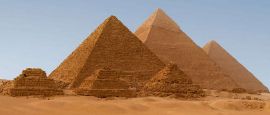Egypt History, Language and Culture
History of Egypt
Egypt's history spans more than five millennia, making it one of the world's longest continuously inhabited civilisations. Ancient Egypt emerged along the Nile River around 3000 BCE, developing a highly organised society centred on divine kingship, monumental architecture and complex religious beliefs. The pyramids, temples and tombs that survive today are the most visible legacy of this period.
Following the decline of the pharaonic era, Egypt came under successive Greek, Roman and Byzantine rule before becoming a centre of Islamic civilisation after the Arab conquest in the 7th century. Cairo grew into a major political, religious and cultural hub, while Egypt remained a vital link between Africa, the Middle East and the Mediterranean world.
In the modern era, Egypt experienced Ottoman rule, European influence and British control before becoming a republic in 1952. Since then, it has played a central role in regional politics while balancing tradition and modernisation. For visitors, Egypt's appeal lies not only in its ancient monuments but in the continuity of daily life shaped by thousands of years of history.
Did you know?
• Ancient Egyptians developed one of the earliest known writing systems, using hieroglyphs more than 5,000 years ago.
• The Nile River was so central to survival that the ancient Egyptian calendar was based entirely on its annual flooding cycle.
• Egypt is home to more pyramids than any other country, with over 100 identified sites across the country.




 You know where
You know where